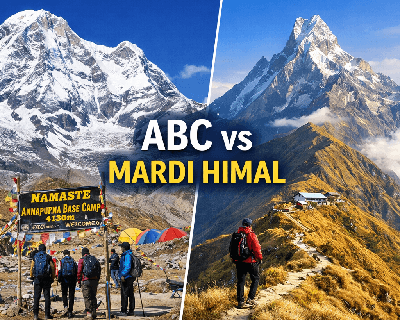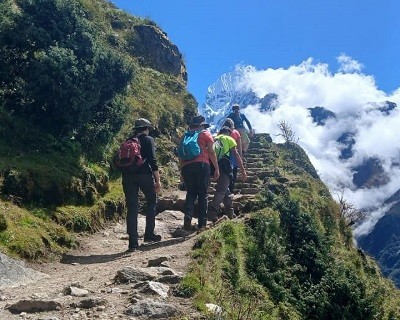Overview
The Everest Base Camp is 5,364 meters or 17,598 feet above sea level. Furthermore, you can also recognize the Everest Base Camp trek as the trek to the lap of the tallest peak in the world, Mt. Everest.
Due to this reason, the Everest Base Camp is considered one of the most thrilling and challenging circuit treks in the Nepali Himalayas, with one of the best destinations. Besides, this base camp is located in Khumbu District, where the Mount Everest expedition is also commenced.
This area's weather and climatic conditions are significantly different or extreme than that in the Kathmandu valley. Therefore, trekkers must be attentive and cautious while attempting the Everest Base Camp.
Highlights of Everest Base Camp trek in January
- Trekkers will experience comparatively less crowd throughout the trial and also in tea houses and lodges.
- The trekking path is comparatively more challenging and more adventurous.
- You can experience the actual cold temperature of th Himalayas and learn how people live in such extreme temperatures and weather conditions.
- Discounts in tea houses and lodges but no compromise in their services.
- A breathtaking and snow-covered view of Everest and other Himalayan giants.
- Long but tireless walks because of cold temperatures and sunny, clear, and cloudless days.
Why January?
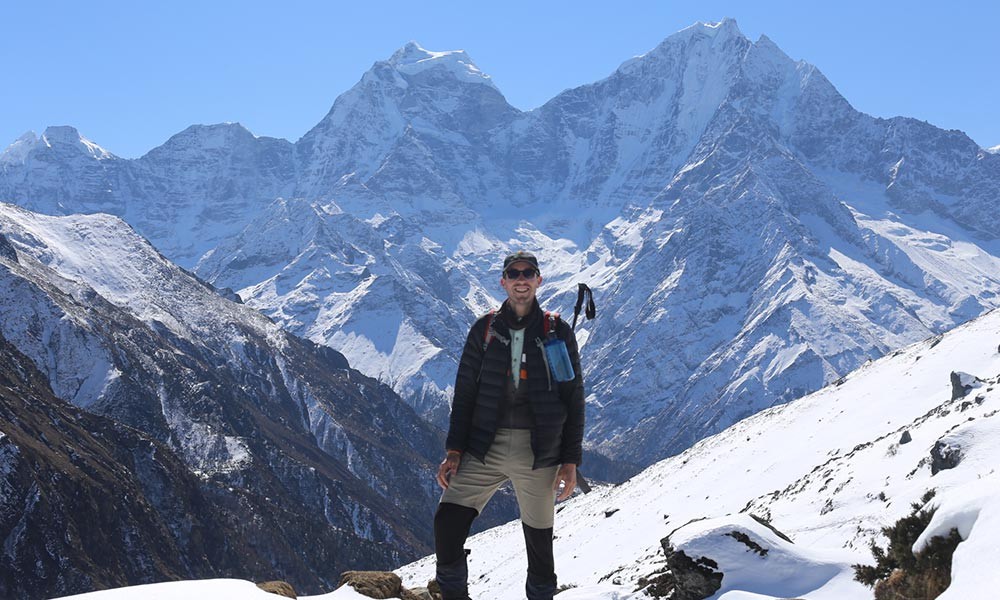 We can explain why Everest Base Camp is best if attempted in January. The first reason is that this trek is comparatively less attempted in January, making the trial less crowded. This also helps while looking for accommodation because no matter where we humans go, an excellent place to stay and good food to eat are the first two things we look for.
We can explain why Everest Base Camp is best if attempted in January. The first reason is that this trek is comparatively less attempted in January, making the trial less crowded. This also helps while looking for accommodation because no matter where we humans go, an excellent place to stay and good food to eat are the first two things we look for.
Besides, let's remember the weather as well because the weather also plays an essential role in the success rate of any trekking in Nepal. The weather condition during January is considered one of the best for the Everest Base Camp trek as it lets you experience the actual coldness of the mountains.
You could also get off-season discounts in many tea houses and lodges as they will have significantly fewer customers in January. On top of that, the owners and staff of the tea houses or motels where you stay will pay more attention to your requirements, and the hospitality level will undoubtedly be much better than in any other peak season. Many professional trekkers love to go for the Everest Base Camp trek in the off-season rather than during the peak season.
More Interaction with the locals
No matter where you go, to know the most about that particular place and its lifestyle, tradition, and culture, interaction with the locals of that area is the best option. Therefore, if you go to the Everest Base Camp, you will also love to talk to the locals and observe how they live.
Here is a tip for all the trekkers if they want to get more attention and time from the locals of the Everest Base Camp. The advice is to go for the trek in January or, say, in off-seasons. When you visit the base camp trek in January, the weather will be cold, so people will not go to work as much as they do in the peak seasons. Therefore, you can meet a lot of locals who will be free and can interact with you highly when compared to that any other month. As a result, you might grab more chances to understand the local lifestyle and culture of the Everest region
Challenging routes
Can you imagine a trekker who wants the trekking path to be easy and the route to have significantly fewer challenges? We have never encountered a trekker trying to go to the Everest Base Camp. Every person who wants to attempt this base camp trek is well-known because the EBC trek is among the most demanding hikes in Nepal.
On top of that, if you love challenges, the winter season might be the best time to visit the Everest Base Camp trek. The challenges that the weather condition and climatic changes create at this time of the year will help you take the full-fledged experience of the Everest Base Camp trek.
Let's not just talk about the challenges. Greenery and lust forests are indeed medicines to the eyes. However, most trekkers do not visit such high-altitude trekking destinations just to see the greens. Instead, they want to experience the pure snow of the Himalayan region, and January, a winter month, is the best month to observe the snow and watch the snow-capped mountains right before your eyes.
So, if you want to experience an actual trek in the most real mountains, we cannot suggest months other than January. After all, trekking is about overcoming challenges and reaching the destination to see those mountains and snow-covered areas that let you feel the cold weather, snow breeze, white and snowy mountains, and a few challenging routes.
Peace of mind
Laps of mountains are the best place to gain peace of mind. Now, imagine you go to a place to get mental stability, but that place is also crowded and full of chaotic people. Is that ideal for anyone who wants peace of mind in the Himalayas? The answer is NO.
Previously when solo treks were permitted, it was good to go for the trekking in the peak seasons for several safety reasons. However, if you want to for the same trek in any month, regardless of January, you can head out because there will always be a guide looking after you. So you can enjoy the peacefulness and holiness of the mountains while your guide is there, making your journey easy and successful.
Ascend the Everest Base Camp trek in January, and you might forget all the worries, tensions, and headaches you ever had before taking a trip to such a beautiful and peaceful place in one of the most delicate and least crowded times of the year.
Observation and worth every penny spent
If you go in January when there is comparatively less crowd, you will get excessive time to explore the trial and its surrounding. As the guides will have few clients, you can also request and extend the days in your itinerary and have a more safe and wholesome trek to the Everest Base Camp.
Fewer crowds, clear skies, and cold weather let you explore the trial more patiently and experience the actual Everest Base Camp rather than rushing for reasonable accommodation and food. Moreover, if there are fewer people, the chances of animal sightings also increase because of the peaceful environment, which means that you might as well get lucky enough to see some of the endangered species not available anywhere else in the world.
No matter how wealthy you are, if you spend your money on something, you would want to enjoy that thing to the fullest. That is why we suggest you trek the Everest Base Camp in January. You can enjoy the entire trip to the fullest. The open path, the clean and healthy environment, the beautiful scenery, and the mental peace that the mountains give you will certainly make you feel happy and regain your energy.
Furthermore, you will also have to spend less on accommodation because of the off-season discounts. However, the facilities you receive will undoubtedly be better than in the peak season. Therefore, if you want a trek worth your investment, we suggest you choose January without thinking twice.
Similar articles you may like:
Safety Measures to Follow during the Everest Base Camp trek in January
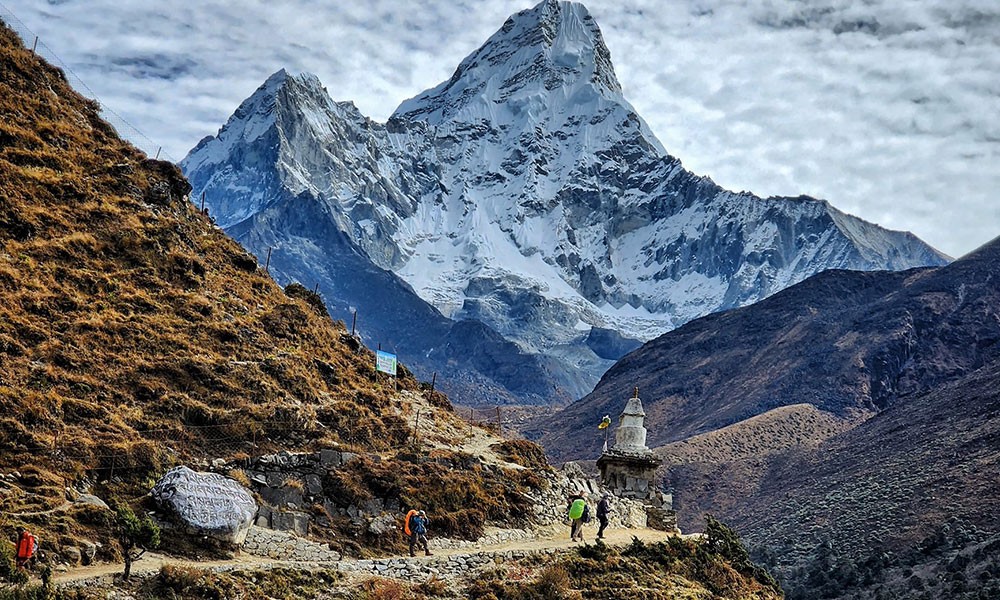 The safety level of the trek always depends upon the safety measures followed by the trekkers. Even though there will be guides to look after the trekkers, it is the visitors' responsibility to stay safe and attentive as well. Everest Base Camp is unlike an ordinary trek, where you can rely entirely on the guides for your safety. There are several things that trekkers should be prepared with, along with hiring a professional guide to complete the Everest Base Camp trek safely, especially in January (off-season).
The safety level of the trek always depends upon the safety measures followed by the trekkers. Even though there will be guides to look after the trekkers, it is the visitors' responsibility to stay safe and attentive as well. Everest Base Camp is unlike an ordinary trek, where you can rely entirely on the guides for your safety. There are several things that trekkers should be prepared with, along with hiring a professional guide to complete the Everest Base Camp trek safely, especially in January (off-season).
Follow the guide throughout the trek
The main thing you need to do to complete the trek safely is to follow your guide. There is a reason why Nepal Government has banned solo trekking, and that is because of the unknown obstacles that might occur certainly during the trek. Even if you have completed the Everest Base Camp in a peak season and are going again in January (off-season), the situations and circumstances can vary highly. That is where you will need a professional or, more specifically, a local expert guide who knows the mountain, the base camp, and the path.
Your guide will help you in every situation, so you first tell the guide in case of any difficulties. Our guides and porters are trained in such a way that they can show the path that you would never think of, and they can carry the backpacks that an average trekker might not be able to take to such a high altitude.
Besides, we have also mentioned that the trial might be more complex in January than in any peak month. Therefore, you must follow your guide to overcome those difficult paths. Moreover, you can think of the guide as your guardian throughout the trek, as they will help you with even the most minor thing during the trek.
Carry necessary gears
No one has the perfect idea about the weather condition at such a high altitude like the Everest Base Camp. On top of that, this is about trekking in January, one of Nepal's coldest months. You might have already understood what you should carry on the trek. Nevertheless, here are a few that we strongly recommend: warm clothes, waterproof clothes, gloves, hats, goggles, sunscreen, water, and first aid.
However, do not limit your packing to just the above-given list. We suggest you do proper research, read more of our blogs, and still, if you need clarification, feel free to call us for assistance. Whatever you do, do not compromise while packing for the trek.
Also, mental and physical fitness is essential to pack with yourself. If you need to train your body harder, no warm clothes, a guide's help, or anything else will help you. Therefore, start gaining stamina and be strong enough to complete the trek without problems.
Be well prepared, pack well, and hire a professional and licensed guide. If you do all these three before heading for the Everest Base Camp, we can ensure you one of the best trekking experiences, even in the off-season.
Necessary papers and contact details of the guide or trekking agency
Remember to carry all the papers and documents with you; we mean the permits and your identification documents. Trekking policies have been made very strict by the government for the safety purpose of trekker's safety. Therefore, you will be checked at several checkpoints for the permits.
Also, carry the ids that provide accurate information about you and contain your emergency contacts. The chances are meager, but sometimes we must predict the climatic changes that harm the journey. If you get tangled in unwanted circumstances, the locals or other trekkers can know about you and help you contact your trekking agency or the guide even if they do not understand your language. Therefore, we request the trekkers carry their ids and all the necessary permits along with themselves to experience a better journey around the base of Mount Everest.
Also, remember that every detail you provide to your guide about yourself would be for your benefit and safety. Therefore, do not hesitate to offer them the correct contact details and other required information before starting the trek.
Budget requirements for fooding at the Everest Base Camp trek in January
.jpg) The teahouses and lodges in the Everest Base Camp trek route offer good fooding and lodging services. They need to work on the fooding variations and services in their rooms and hotels. However, because of the difficulty in transportation and weather conditions, the pricing option offered by the teahouses and lodges might increase to some extent.
The teahouses and lodges in the Everest Base Camp trek route offer good fooding and lodging services. They need to work on the fooding variations and services in their rooms and hotels. However, because of the difficulty in transportation and weather conditions, the pricing option offered by the teahouses and lodges might increase to some extent.
Let us give you a rough sketch of the pricing option you might get as you go to the higher altitude. The average rate for breakfast is $8-$12, and lunch and dinner are approximately $10-$15. However, the accommodation services are reasonable as you only have to pay $10 per person per night.
All the pricings provided above are average costs. As an off-season month, the pricing rates might slightly change in January. If you go trekking in January, the food might get a bit expensive, but the trekkers can get discounts on the accommodation rates because of less crowd (fewer customers).
What is January famous for?
In Nepal, almost every month of the year consists of at least one festival or celebration. Therefore, even if January is a cold and off-season month. One of the best things for trekkers is that they can spend the first month of the year at the base of the tallest mountain in the world.
You can also enjoy the celebration of international new year's eve and new year at Namche Bazaar, which will be decorated to the fullest on these days. Talking about festivals, Lhosar, the main festival of the Himalayan people, falls in January. However, it might also fall in December sometimes, but if you are lucky enough, you will undoubtedly get to celebrate Lhosar in January.
At this time, the Sherpas, Gurungs, and Tamangs will let you see the cultural beauty of the Himalayas, and their devotion to their almighty will surely leave you starstruck.
Altitude Sickness while trekking the Everest Base Camp in January
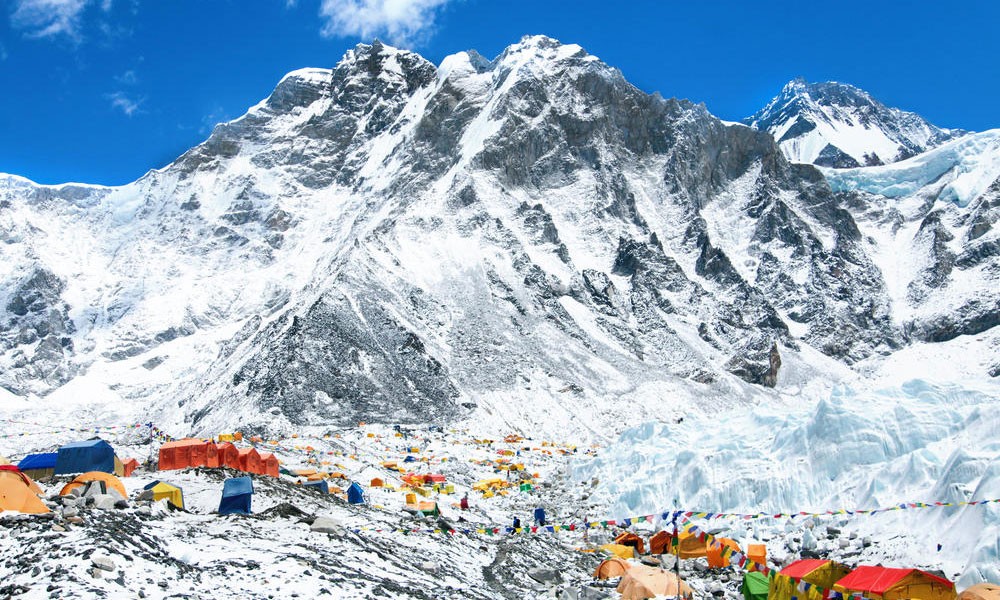
Right from the start of the blog, we have said that January is a cold month and also falls during the off-season. So, all trekkers should remain cautious about the health issues and difficulties the extreme climate of the Himalayas bring in January.
However, you should be confident of these risks and dangers. Instead, you need to overcome these issues and trek the Everest Base Camp with more courage and preparation. The main thing that might bother the trekkers while ascending the base camp is altitude sickness. As you move higher, oxygen will not be sufficient for your body to function well. The challenging trial requires your body to give more strength, but the oxygen level is low. In that case, there is a high chance of trekkers suffering from altitude sickness.
To overcome altitude sickness, we request the trekkers do exercises and workouts for at least two to three months before attempting the Everest Base Camp trek or Everest Three High Passes Trek. If you suffer from problems like asthma, high blood pressure, frequent increase in heartbeat, etc., we recommend you not to go to the Everest Base Camp. Instead, you can try several short treks to train your body and then go for challenging treks like the Everest Base Camp trek.
The weather condition at the higher altitude will be very extreme compared to the lower areas. On top of that, the trial path is also comparatively more challenging in January. As a result, you will need more rest and acclimatization to give strength and energy to your body and mind. Therefore, we request the trekkers only walk for a short time and keep taking breaks during the journey to adapt to the trial and climate.
Professional Advice
Every year, a lot of foreign tourists come to Nepal to visit the Everest Base Camp trek. As per many professional trekkers, this route is quite complex and challenging compared to any other base camp trek in Nepal.
As a professional trekking agency, we suggest all newbie trekkers research the Everest Base Camp before coming for the trek. Furthermore, you will also need a higher level of confidence and physical strength to complete the Everest Base Camp trek.
If you need any other help and assistance or are looking to hire a professional guide for the EBC trek, you can contact us or read more of our blogs. In Nepal, we say that guests are equivalent to gods and take this very seriously.
Therefore, you will not have to worry about many things, and we also ensure a perfect and memorable trek for the trekkers who choose us as their guides. Besides, the experience and knowledge that our guides carry with them will help the enthusiast trekkers take a complete break in the lap of the Himalayas without any fear or uncertainty.
Everest Region Treks:
FAQs
What is the Everest Base Camp trek?
The Everest Base Camp trek is a demanding journey that takes the trekkers around Mount Everest and all the way up to Everest's base camp.
What is the condition of the EBC trek in January?
January is considered chiefly off-time for the Everest Base Camp. However, because of the less crowded path, this is also one of the most peaceful and beautiful times to go for the Everest Base Camp trek.
Are mobile networks and wifi available on the Everest Base Camp journey?
Yes, mobile networks and wifi are available throughout the Everest Base Camp trek, even though the internet speed might be slower than that in urban and city areas. Therefore, the trekkers can still contact their loved ones during the ascend and keep themselves motivated by talking to their family members and friends. Furthermore, mobile networks also help in case of any emergencies.
Do I need any permits to go for the Everest Base Camp trek?
Yes, trekkers will need to obtain the Sagarmatha National Park Entry permit and Khumbu Rural Municipality Permit to be eligible for the Everest Base Camp trek. Besides, as per the latest rule passed by the Tourism Board, trekking with a professional guide is permitted.



 We can explain why Everest Base Camp is best if attempted in January. The first reason is that this trek is comparatively less attempted in January, making the trial less crowded. This also helps while looking for
We can explain why Everest Base Camp is best if attempted in January. The first reason is that this trek is comparatively less attempted in January, making the trial less crowded. This also helps while looking for  The safety level of the trek always depends upon the safety measures followed by the trekkers. Even though there will be guides to look after the trekkers, it is the visitors' responsibility to stay safe and attentive as well. Everest Base Camp is unlike an ordinary trek, where you can rely entirely on the guides for your safety. There are several things that trekkers should be prepared with, along with hiring a professional guide to complete the Everest Base Camp trek safely, especially in January (off-season).
The safety level of the trek always depends upon the safety measures followed by the trekkers. Even though there will be guides to look after the trekkers, it is the visitors' responsibility to stay safe and attentive as well. Everest Base Camp is unlike an ordinary trek, where you can rely entirely on the guides for your safety. There are several things that trekkers should be prepared with, along with hiring a professional guide to complete the Everest Base Camp trek safely, especially in January (off-season)..jpg) The teahouses and lodges in the Everest Base Camp trek route offer good fooding and lodging services. They need to work on the fooding variations and services in their rooms and hotels. However, because of the difficulty in transportation and weather conditions, the pricing option offered by the teahouses and lodges might increase to some extent.
The teahouses and lodges in the Everest Base Camp trek route offer good fooding and lodging services. They need to work on the fooding variations and services in their rooms and hotels. However, because of the difficulty in transportation and weather conditions, the pricing option offered by the teahouses and lodges might increase to some extent.

